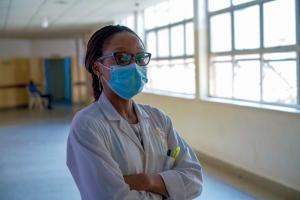COVID-19 pandemic- health workers affirm improvements in infection prevention and control
Abuja, 28 March, 2022 - “It’s hard to remember life without COVID-19 anymore, we have become so used to wearing masks and preventives that not doing so makes it look weird” says Dr Oje Uzochi, a Medical Officer at Asokoro General Hospital, Federal Capital Territory (FCT) Abuja.
The 35-year-old pediatrician also mentioned that despite the sad incidents COVID-19 left behind, it has also helped in improving infection prevention and control (IPC) in hospitals.
To Dr Uzochi, “We are much more protected now, it is good to say we do not take as much diseases home as we used to and I have had less flu in the last few years than before the pandemic. Most times children can cough on your face during consultation and you tend to get infected after a few days, it is not like that anymore”.
“Patients are generally much more aware of hygiene as I could remember struggling with parents to wash hands, sterilize things and be conscious of their environment, but now they do it themselves so there are less diseases presented at the hospital presently.”
Another health practitioner, 47-year-old intensive care unit (ICU) nurse at the same hospital, Mr Apollos Haruna, who has been practicing for over 20 years, also shared his experience. To him, “COVID-19 has changed and improved the entire hospital system in terms of infection prevention and control. Before the pandemic, we weren’t taking things like handwashing seriously, but now it has become the norm, we do instinctively, whether we interact with people or not.”
Also, he said, “I used to face some kind of stigma especially because the hospital I worked for was a COVID-19 treatment center, people were always distancing themselves from me thinking I would transfer the virus to them, luckily for me as I was very strict with the COVID-19 guidelines I never contracted the virus”.
It has been two years into the COVID-19 pandemic, results of a study conducted nationwide by the Nigeria Centre for Disease Control (NCDC), shows that over 50 per cent of Nigerians have been exposed to the virus, and have antibodies for COVID-19.
The first case of the virus was detected in Nigeria on February 27, 2020. According to the Nigeria Centre Disease Control (NCFC), the country has since then confirmed over 250 000 cases, with over 3 000 deaths.
While commemorating the two years’ anniversary of COVID-19 in Nigeria, the Director General NCDC Dr Ifedayo Adetifa mentioned that several efforts have been made towards improving the health system, as well as increased investment in response to the COVID-19 pandemic in the past few years. During the pandemic, the NCDC supported the establishment of infectious disease treatment centers, molecular laboratories, and public health emergency operation centers in all States, and provided equipment required for critical care in hospitals.
“NCDC has also led the training of over 40 000 health workers on infection prevention and control, completed the digitalization of the country’s infectious disease surveillance system, provided support including vehicles for outbreak investigation across states, and ensured regular supplies of treatment and testing supplies among other activities”.
He further called on Nigerians who are yet to take the vaccine to hastily do so to ensure a COVID-19 free Nigeria.
In a bid to keep lowering infection rates, Nigeria’s Federal Capital Territory and all 36 state governments have invested in training their health workers with the support of WHO. The national and state governments have also strived to make personal protective equipment and other essential supplies more readily available to health workers. Nigeria has benefited from the United Nations Solidarity Flight campaign, which distributed essential medical supplies including personal protective equipment and ventilators.
“The training of the first set of trainers for IPC across the six geopolitical zones of the country was supported by WHO. Thereafter WHO supported specific state level trainings on IPC. WHO also supported the development of the first national IPC manual for the country and is currently supporting the review of the National IPC policy” says Professor Adebola Olayinka, WHO Nigeria focal person on IPC.
WHO will continue to support Nigeria on IPC and making sure the pandemic is contained.
Technical Contact:
Prof. Adebola Olayinka; Email: aolayinka [at] who.int (aolayinka[at]who[dot]int)



